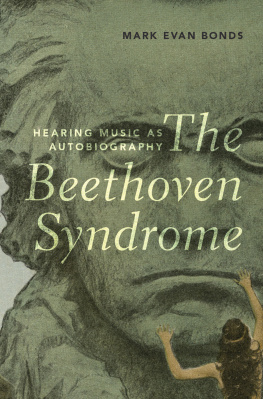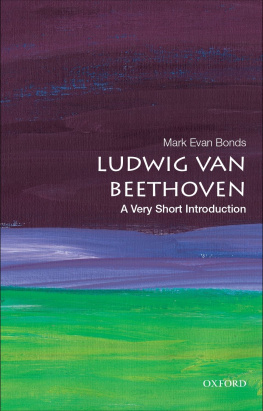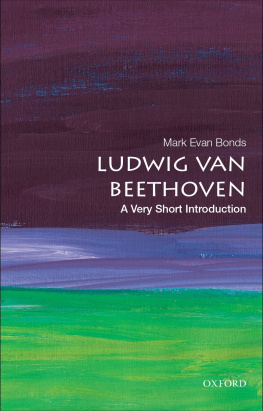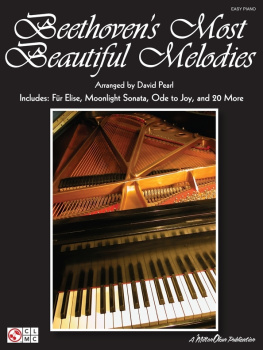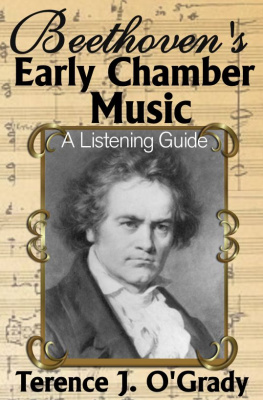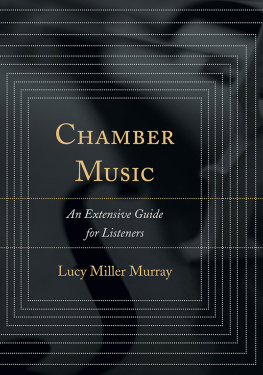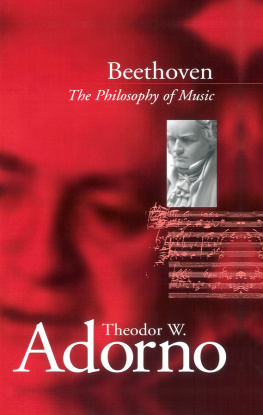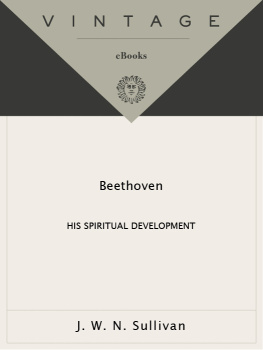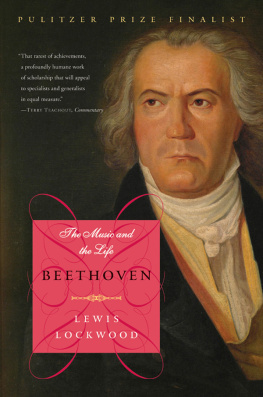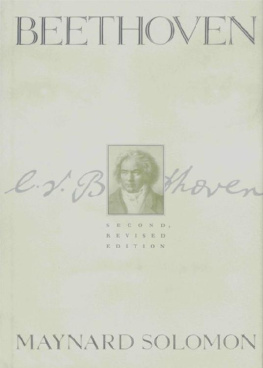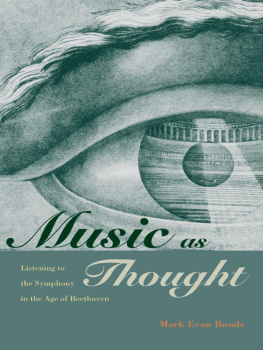The Beethoven Syndrome

Oxford University Press is a department of the University of Oxford. It furthers the Universitys objective of excellence in research, scholarship, and education by publishing worldwide. Oxford is a registered trade mark of Oxford University Press in the UK and certain other countries.
Published in the United States of America by Oxford University Press
198 Madison Avenue, New York, NY 10016, United States of America.
Oxford University Press 2020
All rights reserved. No part of this publication may be reproduced, stored in a retrieval system, or transmitted, in any form or by any means, without the prior permission in writing of Oxford University Press, or as expressly permitted by law, by license, or under terms agreed with the appropriate reproduction rights organization. Inquiries concerning reproduction outside the scope of the above should be sent to the Rights Department, Oxford University Press, at the address above.
You must not circulate this work in any other form and you must impose this same condition on any acquirer.
Library of Congress Cataloging-in-Publication Data
Names: Bonds, Mark Evan, author.
Title: The Beethoven syndrome : hearing music as autobiography / Mark Evan Bonds.
Description: New York, NY : Oxford University Press, [2020] |
Includes bibliographical references.
Identifiers: LCCN 2019020718 | ISBN 9780190068479 (hardback) |
ISBN 9780190068509 (online) | ISBN 9780190068486 (updf) | ISBN 9780190068493 (epub)
Subjects: LCSH: MusicPhilosophy and aestheticsHistory. |
Expression (Philosophy)History. | Beethoven, Ludwig van, 17701827AppreciationHistory.
Classification: LCC ML3800 B75 2019 | DDC 781.1/7dc23
LC record available at https://lccn.loc.gov/2019020718
Oxford University Press gratefully acknowledges the Joseph Kerman Endowment of the American Musicological Society, funded in part by the National Endowment for the Humanities and the Andrew W. Mellon Foundation, for support in the publication of this book.
To Sam Hammond
Table of Contents
I am grateful to the National Endowment for the Humanities, the Institute for Advanced Study, and the Austrian National Science Foundation (FWF), whose support during the period 201517 allowed me to complete the bulk of this study. It is particularly fitting that my time in Princeton at the Institute for Advanced Study was made possible by a fellowship endowed by the late Edward T. Cone, whose writings on the compositional persona provided an important starting point for my research.
I have also benefitted from ongoing conversations with departmental colleagues at the University of North Carolina at Chapel Hill, particularly Andrea Bohlman, Tim Carter, Annegret Fauser, and Stefan Litwin. The staff of the Music Library therePhilip Vandermeer, Diane Steinhaus, and Carrie Monetteprovided its consistenly unfailing support.
Colleagues at other institutions with whom I wish I could have had more conversations include Francesca Brittan (Case Western Reserve), Todd Cronan and Kevin Karnes (Emory), Ryan Ebright (Bowling Green State University), James Hepokoski (Yale), William Kinderman (University of Illinois), Tomas McAuley and David Trippett (Cambridge), Christopher Reynolds (University of California, Davis), William Robin (University of Maryland), Gilbert Sewall (Phillips Academy), Elaine Sisman (Columbia), Christian Thorau (Universitt Potsdam), and Jeremy Yudkin (Boston University). My year in Vienna on a stipend from the Lise-Meitner-Programm was especially valuable, and I will always have fond memories of discussions with my sponsor there, Birgit Lodes (Universitt Wien), and with her colleagues John D. Wilson and Elisabeth Reisinger. Evenings with the three Ms from the Universitt fr Musik und darstellende Kunst WienMarie-Agnes Dittrich, Martin Eybl, and Melanie Unseldwere as delightful as they were thought-provoking. And I owe special thanks to Michael Morse (Trent University), who somehow managed to make sense of a very early draft of this book and pointed out the many ways in which it could be improved.
At Oxford University Press, Suzanne Ryan, was once again the ideal editor and Barbara Norton the ideal copy editor.
As always, my family helped in far more ways than they could possibly realize. While often indirect, those ways were no less important to bringing this project to fruition. To Dorothea, Peter, and Andrew: Thank you.
* * *
Portions of appeared in a slightly different form in chapter 13 of my Absolute Music: The History of an Idea (New York: Oxford University Press, 2014).
| 19CM | 19th-Century Music |
| AfMw | Archiv fr Musikwissenschaft |
| AmZ | Allgemeine musikalische Zeitung |
| BAmZ | Berliner Allgemeine musikalische Zeitung |
| BGA | Ludwig van Beethoven, Briefwechsel: Gesamtausgabe, 7 vols., ed. Sieghard Brandenburg (Munich: G. Henle, 199698). |
| JAMS | Journal of the American Musicological Society |
| KdU | Immanuel Kant, Kritik der Urteilskraft, ed. Heiner F. Klemme (Hamburg: Felix Meiner, 2001). |
| KFSA | Friedrich Schlegel, Kritische Friedrich-Schlegel-Ausgabe, ed. Ernst Behler et al. (Munich: Ferdinand Schningh, 1958). |
| MQ | Musical Quarterly |
| NZfM | Neue Zeitschrift fr Musik |
Unless otherwise noted, emphases in quotations appear in the original, and all translations are my own.
The Beethoven Syndrome
In short, no one during Beethovens lifetime perceived his music as an expression of his inner self.
Yet by the middle of the nineteenth century listeners were routinely hearing Beethovens music as a revelation of his soul, and they regarded his soul, in turn, as the key to understanding his music. Critics eagerly mapped his life onto his works and his works onto his life. This new way of listening, moreover, extended well beyond Beethoven: audiences were now predisposed to hear the music of all composersparticularly their instrumental worksas a personal outpouring of the self, a form of sonic autobiography.
What changed? Why did listeners begin to hear music in such a fundamentally new way in such a short span of time? And why, in turn, has this mode of listening become increasingly suspect over the past hundred years? The inclination of listeners to hear composers in their musicthe Beethoven syndromeis so deeply ingrained that it is easy to forget just how novel and powerful it was for almost a century. Syndrome is not too strong a term. As in medicine, it is used here to indicate a pattern of symptoms, in this case behaviors that point to an underlying condition. The predisposition to hear music as a form of autobiography began in responses to Beethoven but soon extended to the output of composers in general and dominated musical criticism for almost a hundred years. Listeners routinely turned to biography to explain the general tendencies of what they were hearing in any given artists output, as well as any unusual exceptions to those tendencies. The rapid decline of such habits of listening in the 1920s reflects a general recognition that this predisposition, while not wholly without foundation, had gone too far. This mode of listening nevertheless remain with us today, even if in diminished form.

